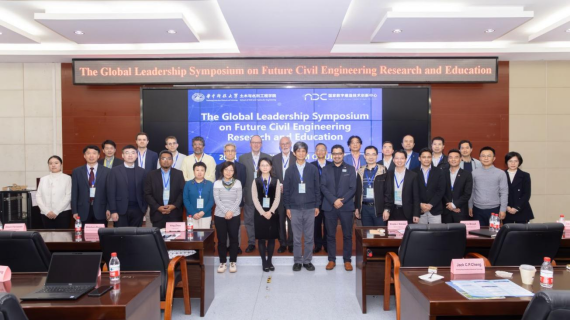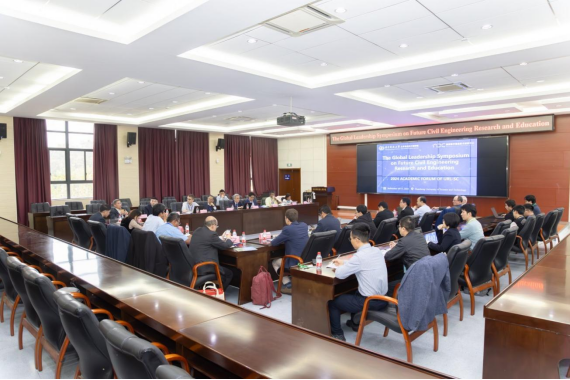The Global Leadership Symposium on Future Civil Engineering Research and Education, co-hosted by the School of Civil and Hydraulic Engineering at Huazhong University of Science and Technology (HUST) and the National Center of Technology Innovation for Digital Construction, was successfully held at HUST on November 16-17, 2024. The symposium invited more than 20 current or former civil engineering chairs, academic leaders, and internationally renowned researchers from 18 universities of 11 countries. These universities include (in alphabetic order): HUST, The Hong Kong Polytechnic University, Hong Kong University of Science and Technology, Meijo University, National University of Singapore, Sungkyunkwan University, Tsinghua University, Tongji University, University College London, University of Alberta, University of Edinburgh, University of Lille, University of Maryland, University of Sydney, University of Technology Sydney, University of Utah, Universiti Sains Malaysia, and Warsaw University of Technology. In addition, the symposium attracted more than 50 participants from HUST and other institutions in China.

The symposium was aimed to explore cutting-edge educational and research pathways for the future of civil engineering through international exchange and collaboration. The symposium engaged in in-depth discussions on the following key topics:
·Core Body of Knowledge for Civil Engineering Education: Experts discussed the essential knowledge that should be included in future civil engineering programs to meet the evolving needs of the industry.
·Adjustments to Undergraduate Curriculum: The participants explored which content in current undergraduate curricula could be revised and which areas should be strengthened to better align with future needs.
·Challenges and Solutions in Civil Engineering Education: The symposium addressed the challenges faced by various institutions in civil engineering education and shared strategies and experiences to overcome these challenges.
·Visions for Future Civil Engineering Research Directions and Models: Experts shared their perspectives on the future of civil engineering research, including how emerging technologies and climate change can drive industry development.

After thorough discussions, the participants reached the following consensus:
·Civil Engineering Curriculum Innovation: Although fundamental civil engineering courses should be maintained, a flexible curriculum is as important. In order to prepare multidisciplinary professionals to meet the future needs, new subjects on emerging technologies such as artificial intelligence, the Internet of Things, and digital twins should be integrated, together with the fundamentals on climate change, sustainability and systematic thinking. Issues like choice between prioritizing generic problem solving tools for engineering decision support versus specific means are worthy of future consideration.
·Civil Engineering Education Mode Change: Artificial intelligence provides extensive new possibilities for civil engineering learning. Educators are encouraged to make use of AI tools in their classrooms and beyond. Internship and practice-oriented learning are still the keys to enhance learning outcomes, while life-long learning is essential to any professional in the field.
·Interdisciplinary Collaborative Research: There should be deeper integration of civil engineering with disciplines such as computer science, automation engineering, bioengineering, and materials engineering to address complex engineering challenges in the context of global climate change, enhancing the intelligence, scientific rigor, and sustainability of engineering construction.
·Industry-University-Research Collaboration and Integration: Strengthening the synergy among academic research, industry practice, and the education system in civil engineering is crucial. Through technological innovation, policy support, educational reform and social outreach, the industry can be assisted in its transformation and upgrading.
·International Collaboration and Regional Exchange: Promoting international academic exchange and regional cooperation is vital to addressing the global
challenges facing civil engineering. By building a multilateral platform for shared research and education, global civil engineering industries can be developed collaboratively.
This symposium has fostered international academic exchange in the field of civil engineering. By gathering collective wisdom and expertise, the symposium has provided innovative ideas to tackle the global challenges in civil engineering, showcasing the promising future of the industry.
Edited by: Chang Wen, Peng Yumeng
